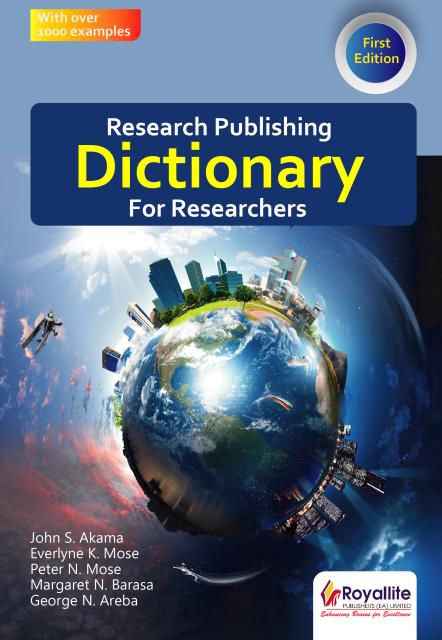Research publishing Dictionary: For Researchers
Keywords:
publishingSynopsis
Dictionaries occupy a unique niche in research publishing-just like they do in all other disciplines, in that they define concepts as used at various times. Their writing demands a thorough and extensive study of a wide range of concepts, terms, and expressions as used at the time of writing. At a time we witness knowledge explosion, thanks to Information Communication Technologies (ICTs), we expect that what we previously referred to as knowledge has changed significantly: some concepts might disappear from our use, some will expand their references, and some might narrow their scopes of reference. With technological changes also comes our approach to epistemology: how we define knowledge, what we teach, and how we teach must change to be in tandem with the changing knowledge infrastructure. This dictionary came as a result of three considerations: the ever expanding graduate education in Kenya, the necessity of graduate research publishing as part of the requirement for the conferment of graduate degrees, and a recognition that technological changes have affected, in more than one way, what we refer to as knowledge. Thirty years ago, we had less than six universities in Kenya but the number of universities has grown exponentially. Alongside their growth is expansion of their programmes which includes the introduction of graduate studies. All graduate programmes in Kenya have research components part of which is that students should publish their research with peer refereed journals before they graduate. Finally, knowledge bases have shifted following the rapid changes occasioned by globalization and Information Communication Technology. We observe that these three motivations underlie the need for continuous publication of books, dictionaries, and other publications. The writing of this dictionary was done by a wide literature review of what were considered important words and expressions in research publishing. The researchers collected a wide range of these and then the whole list was put together for further analysis to agree if such terms and expressions needed to be included in the dictionary. The process profited a lot since each of the authors comes from a different academic orientation and specialization. An agreement was made on which terms would make it to the final manuscript, the substance of which is presented herein. We, however, state that this is not an all-encompassing dictionary in research publishing. The expressions we chose to present are those we considered core and urgent since our supervision of research publishing indicates that some terms present challenges in their use. We therefore hope that this dictionary will spur interest among fellow researchers to engage in describing important terms in their areas of specialization. Since knowledge keeps evolving, we will be looking forward to a second, and possibly, a third edition of this dictionary, which will include expressions we thought are obvious, but which readers might wish were included. We hope that our audience will be free to point out what will be necessary and critical to include in subsequent editions. The dictionary is organized in alphabetical order with a bibliography at the end, i.e. a list of the publications that the authors reviewed to pick, read, and understand the various expressions. We use the term bibliography since the terms are explained from a wide understanding based on our research experience and from what fellow scholars think those terms mean.





